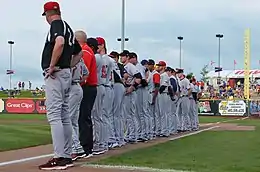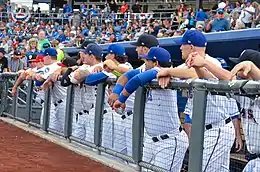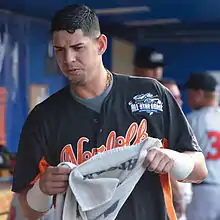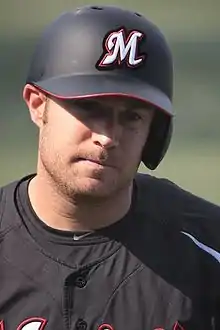Triple-A All-Star Game
The Triple-A All-Star Game is an annual baseball game sanctioned by Minor League Baseball between professional players from the two affiliated Triple-A leagues—the International League (IL) and the Pacific Coast League (PCL). Each league fields a team composed of players in their respective leagues as voted on by fans, the media, and each club's field manager, coaches, and general manager.[1] From the inaugural 1988 event through 1997, teams of American League-affiliated Triple-A All-Stars faced off against teams of National League-affiliated Triple-A All-Stars.
| Triple-A All-Star Game | |
|---|---|
 | |
| Frequency | Annual |
| Location(s) | Varies (see prose) |
| Inaugurated | July 13, 1988 (Pilot Field, Buffalo, New York, United States) |
| Most recent | July 10, 2019 (Southwest University Park, El Paso, Texas, United States) |
| Previous event | July 11, 2018 (Huntington Park, Columbus, Ohio, United States) |
| Next event | TBD 2021 (Dell Diamond, Round Rock, Texas, United States) |
| Participants | Triple-A minor league baseball players |
| Organized by | Triple-A Baseball |
| Website | Official website |
Traditionally, the game has taken place on the day after the mid-summer Major League Baseball All-Star Game.[2] The game is meant to mark a symbolic halfway-point in the season (though not the mathematical halfway-point which, for most seasons, is usually one month prior). Both Triple-A leagues share a common All-Star break, with no regular-season games scheduled for two days before the All-Star Game itself. Some additional events, such as the All-Star Fan Fest and Triple-A Home Run Derby, take place each year during this break in the regular season.[3]
History

The Triple-A All-Star Game has been played every season since 1988.[4] The inaugural game was played in Buffalo, New York. The host city has since alternated annually between cities in each Triple-A league. Currently, the International League hosts in odd-numbered years and the Pacific Coast League hosts in even-numbered years.[5] Only Albuquerque, New Mexico; Buffalo; Columbus, Ohio; Louisville, Kentucky; and Salt Lake City, Utah, have hosted on multiple occasions, each having hosting twice. Five current Triple-A cities have never hosted the event, nor are currently scheduled to host in the future: Fresno, California; Lawrenceville, Georgia; Round Rock, Texas; San Antonio, Texas; Syracuse, New York; and Worcester, Massachusetts.
When it began, there were three Triple-A leagues in the United States: the American Association, International League, and Pacific Coast League. Due to the odd number of leagues, it was decided that one team would be made up of All-Stars from American League affiliates and the other of National League affiliates.[4] The American Association ceased operations after the 1997 season. So in 1998, the teams were reorganized so that one team consisted of International League All-Stars and the other of Pacific Coast League All-Stars.[6]
From 2006 to 2016, the winning league earned the distinction of having its league champion (determined at the end of the season) being given home team status for the Triple-A National Championship Game, a single game to determine a Triple-A champion in the postseason.[7] This changed in 2017, when home team status began being awarded to the team from the league which hosts the championship game.[8]
The start of the 2020 season was postponed due to the COVID-19 pandemic before ultimately being cancelled on June 30.[9][10] This resulted in the cancellation of the game.
Structure

Each league's roster consists of 30 players, though the actual number of players on gameday may be less due to call-ups, injuries, or players choosing not to participate.[11] Thirteen players are elected for each team through a vote by fans, team personnel, and media members.[12] Fans can submit online ballots with votes for one player at each infield position, a catcher, a designated hitter, three outfielders, and four pitchers—two starters and two relievers. Fan balloting accounts for one-third of the total vote.[12] The ballots of each club's field manager, coaches, and general manager account for another third.[12] Votes from broadcasters and members of the media make up the final third.[12] Once 13 All-Stars are elected, each league office selects an additional 17 players to fill out their roster.[12] One goal of adding these additional players is to make sure every Triple-A team is represented on the All-Star rosters.
The game itself consists of a single nine-inning game to determine a champion. The only All-Star game to ever go beyond the prescribed nine innings was the 2004 game held in Pawtucket, Rhode Island, at McCoy Stadium.[13] Triple-A rules restricted the game from going beyond 10 innings, but the International League scored in the bottom of the 10th inning, avoiding a tie game as the result.[13] The league in which the host city competes is considered the home team for the game and the other team is designated the visiting team. Designated hitters bat in place of the pitchers.
Historically, players wore their respective team's uniforms. Players on the home team wore their club's white home uniforms, while players on the away team wore their club's gray road uniforms. Usually a patch depicting the game's logo was sewn onto their jerseys and caps. This changed temporarily in 2017 when players wore league-specific jerseys paired with the appropriate home/road pants and their respective team's cap.[14][15] Players wore the uniforms of their respective clubs again in the 2018 game. [16]
The game is umpired by a four-man crew with one umpire behind home plate and the others covering each base. Two of the umpires work in the IL, while two work in the PCL. Assignments rotate each year such that IL umpires are assigned to home plate and second base in even years, and PCL umpires man those positions in odd years.[17]
Results
1988–1997: American League vs. National League
| National League (6 wins) | American League (4 wins) |
1998–present: International League vs. Pacific Coast League
| International League (12 wins) | Pacific Coast League (10 wins) |
Future games
| Date | City | Ballpark | Host team (league) | Refs. |
|---|---|---|---|---|
| July 2021 | Round Rock, Texas | Dell Diamond | Round Rock Express (PCL) | [24][25] |
Awards

The Most Valuable Player (MVP) awards at the Triple-A All-Star Game have gone by various names. One player was selected in the inaugural 1988 contest for the SportsTicker "Star of Stars" Award. From 1989 through 1997, the award was bestowed upon one player from each Triple-A league. For 2004, this award was renamed the TSN "Star of the Game" Award. Since 2005, it has been known as the MiLB.com "Top Star" Award.[26]
Additional awards were given out to honor the best overall performance and/or best pitching performance from 2000 to 2008. From 2000 to 2003, two players were honored as the Maurice Lacroix/Lou Gehrig Players of the Game—one as "Player of the Game" and one as "Pitcher of the Game." In 2004, one player was selected as the "Dodge Most Valuable Player." From 2005 to 2007, this award has given out as the Bank of America Most Valuable Player Award. The Bank of America Most Valuable Pitcher Award was given in 2008.[26]
The team with the most MVP winners (excluding additional awards from 2000 to 2008) is the International League's Gwinnett Stripers (formerly the Richmond Braves) with six MVPs. The IL's Buffalo Bisons and Pacific Coast League's Oklahoma City Dodgers (formerly the Oklahoma City 89ers and Oklahoma/Oklahoma City RedHawks) are tied for second place with five MVPs. The only player to win more than one regular MVP award is Luis Lopez who won in 1994 with the IL's Richmond Braves and in 1995 with the IL's Buffalo Bisons.[26]
1988–1997
1998–present
Notable All-Stars

Of the more than 1,200 players that have participated in the Triple-A All-Star Game,[29] 108 have also been selected for the Major League Baseball All-Star Game.[28] These players are:
- Ozzie Albies
- Sandy Alomar, Jr.
- Yonder Alonso
- Jesus Aguilar
- Garret Anderson
- Bronson Arroyo
- Jay Bell
- Ronnie Belliard
- José Berríos
- Hank Blalock
- Aaron Boone
- Bret Boone
- Jackie Bradley Jr.
- Jeromy Burnitz
- Jeff Conine
- Ron Coomer
- Scott Cooper
- Joey Cora
- Jesse Crain
- Carl Crawford
- Joe Crede
- Nelson Cruz
- Michael Cuddyer
- Josh Donaldson
- Justin Duchscherer
- Adam Dunn
- Ray Durham
- Adam Duvall
- Damion Easley
- Edwin Encarnación
- Alcides Escobar
- Johnny Estrada
- Carl Everett
- Steve Finley
- Darrin Fletcher
- Carlos García
- Brian Giles
- Álex González
- Juan González
- Alex Gordon
- Dan Haren
- Corey Hart
- Matt Harvey
- Todd Helton
- Liam Hendriks
- Ken Hill
- Orlando Hudson
- Todd Hundley
- Jason Isringhausen
- Gregg Jefferies
- Derek Jeter
- Lance Johnson
- Adam Jones
- Chipper Jones
- Howie Kendrick
- Ian Kinsler
- Jason Kipnis
- Ryan Klesko
- Paul Konerko
- Bryan LaHair
- Paul Lo Duca
- Kenny Lofton
- Javy López
- Mark Loretta
- Mike Lowell
- Ryan Ludwick
- Ketel Marte
- Starling Marte
- Pedro Martínez
- Ramón Martínez
- Tino Martinez
- Andrew McCutchen
- Nate McLouth
- Devin Mesoraco
- Justin Morneau
- Brandon Moss
- Edward Mujica
- Wil Myers
- Denny Neagle
- Eduardo Núñez
- José Offerman
- Magglio Ordóñez
- Joc Pederson
- Jhonny Peralta
- Mike Piazza
- Jorge Polanco
- Rick Reed
- Henry Rodríguez
- José Rosado
- Gary Sánchez
- Joe Saunders
- Marco Scutaro
- Richie Sexson
- George Sherrill
- Alfonso Soriano
- Geovany Soto
- Ed Sprague
- Jim Thome
- Mark Trumbo
- Chase Utley
- Greg Vaughn
- Daniel Vogelbach
- Joey Votto
- Michael Wacha
- Bob Wickman
- Bernie Williams
- Kirby Yates
- Dmitri Young
Home Run Derby



The Triple-A Home Run Derby is an annual home run hitting contest customarily held two days before the Triple-A All-Star Game.[30] Though the rules change from year to year, the most recent iteration featured six players, three from each league, competing to see who can hit the most home runs.[31]
Rob Stratton (2003 and 2007) and Chad Huffman (2009 and 2018) are the only participants to win the derby twice. Juan González is the only player to win the Triple-A Home Run Derby and the Major League Baseball Home Run Derby. He won the Triple-A version in 1990 and the MLB version in 1993.[32] The winners of each year's contest are as follows.[33]
Television
The 1988 All-Star Game was televised on ESPN.[4] The sports network and other regional sports channels aired subsequent contests. It was broadcast on ESPN2 from 1995 to 2009.[6][19] The game has aired on MLB Network since 2010.[34]
See also
References
- Specific
- "Online Fan Voting Has Begun for 2017 Triple-A All-Star Game". Minor League Baseball. May 26, 2017. Retrieved June 28, 2017.
- "Omaha Storm Chasers and Werner Park to Host 2015 Triple-A Baseball All-Star Game". Omaha Storm Chasers. Minor League Baseball. March 5, 2014. Retrieved August 19, 2014.
- "Durham Lands 2014 Triple-A ASG". Minor League Baseball. February 20, 2013. Retrieved August 19, 2014.
- "Triple-A All-Star Game Results (1988–1992)". Triple-A Baseball. Retrieved August 19, 2014.
- Collins, Danny (June 29, 2017). "Collins: Is AAA All-Star Game a pipe dream for PNC Field? Hardly". The Times-Tribune. Retrieved July 12, 2017.
- "Triple-A All-Star Game Results (1993–1997)". Triple-A Baseball. Retrieved August 19, 2014.
- "Bricktown Showdown To Determine Triple-A Baseball Champion" (PDF). Triple-A Baseball. July 12, 2006. Retrieved August 19, 2014.
- "2017 Governors' Cup Playoffs Preview" (PDF). International League. August 11, 2017. p. 4. Retrieved August 11, 2017.
- "A Message From Pat O'Conner". Minor League Baseball. March 13, 2020. Retrieved May 5, 2020.
- "2020 Minor League Baseball Season Shelved". Minor League Baseball. June 30, 2020. Retrieved July 1, 2020.
- Wild, Danny (June 28, 2017). "Rosario, Weaver, Fisher named PCL All-Stars". Minor League Baseball. Retrieved June 28, 2017.
- "2017 International League All-Star Team Announced" (PDF). Minor League Baseball. June 29, 2017. Retrieved June 29, 2017.
- "Triple-A All-Star Game Results (2003–2007)". Triple-A Baseball. Retrieved August 19, 2014.
- @RainiersLand (July 11, 2017). "It's your 2017 PCL Triple-A All-Star team!" (Tweet) – via Twitter.
- @RainiersLand (July 11, 2017). "And now for the International League. Your 2017 Triple-A All-Star team!" (Tweet) – via Twitter.
- See http://www.dispatch.com/sports/20180711/pcl-batters-steal-triple-a-all-star-spotlight-at-huntington-park, reviewed July 18, 2018.
- "Umpire Crew unveiled for 2017 Triple-A All-Star Game". Minor League Baseball. June 22, 2017. Retrieved June 29, 2017.
- "Triple-A All-Star Game Results (1998–2002)". Triple-A Baseball. Retrieved August 19, 2014.
- "Triple-A All-Star Game Results (2008–2012)". Triple-A Baseball. Retrieved June 29, 2017.
- "Triple-A All-Star Game Results (2013–present)". Triple-A Baseball. Retrieved August 19, 2014.
- "PCL All-Stars vs. INT All-Stars". MiLB.com. July 11, 2018. Retrieved July 11, 2018.
- "INT All-Stars vs. PCL All-Stars Box Score". MiLB.com. July 10, 2019. Retrieved July 11, 2019.
- Bumbaca, Chris (December 8, 2018). "RailRiders take '20 Triple-A All-Star reins". Minor League Baseball. Retrieved December 6, 2018.
- "Round Rock Express, Dell Diamond To Host 2021 Triple-A All-Star Game". Ballpark Digest. July 25, 2019. Retrieved July 29, 2019.
- "Triple-A All-Star Game - 2021 and Beyond..." Triple-A Baseball. Retrieved August 10, 2020.
- "Triple-A All-Star Game Records" (PDF). Triple-A Baseball. Retrieved August 19, 2014.
- Ravich, Jared (July 10, 2019). "France Powers PCL to Another All-Star Win". MiLB.com. Retrieved July 11, 2019.
- "Triple-A All-Star Game – Participants". Triple-A Baseball. Retrieved November 2, 2018.
- "All-Time Roster by Player" (PDF). Triple-A Baseball. Retrieved July 8, 2017.
- Speddon, Zach (June 22, 2017). "Tacoma to Host 2017 Triple-A All-Star Game". Ballpark Digest. Retrieved June 9, 2016.
- Curto, Mike (July 10, 2017). "Triple-A Home Run Derby Preview". Booth, Justice and the American Pastime. Retrieved July 10, 2017.
- "All-Star Game Home Run Derby History". Major League Baseball. Retrieved July 12, 2017.
- "Triple-A All-Star Home Run Derby Winners". 2017 Pacific Coast League Sketch & Record Book. Pacific Coast League. 2017. p. 162.
- "Triple-A All-Star Game to again be nationally televised". Minor League Baseball. June 22, 2017. Retrieved June 22, 2017.
- General
- "Triple-A All-Star Game". Triple-A Baseball. Retrieved August 19, 2014.
- "Triple-A All-Star Game Records" (PDF). Triple-A Baseball. Retrieved August 19, 2014.
External links
| Wikimedia Commons has media related to Triple-A All-Star Game. |